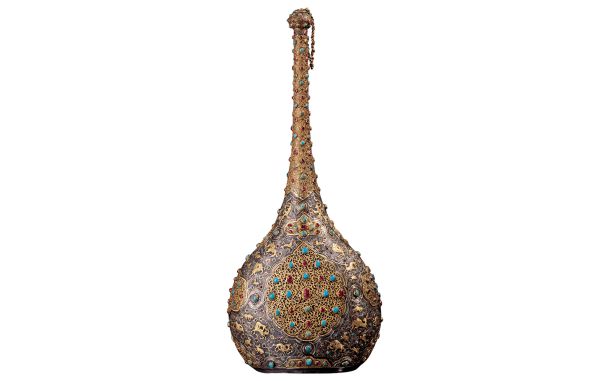Muqarrabun (Those Near-Stationed To God)

In This Article
-
These blessed ones that are favored with God’s special nearness are guides on the way to God.
-
All of the saints are those who have certain degrees of knowledge of God, who are supported by God.
-
The substitutes are like a center of gravity for the earth; God employs them as a spiritual means of keeping the earth on its axis.
Muqarrabun are higher in rank than the godly, virtuous ones due to their special nearness to God. This exalted title is also used for the most distinguished ones among the Prophets and angels. These blessed ones that are favored with God’s special nearness are guides on the way to God, distinguished “lions” in the quarter of the truth, mythical birds who continue their journeying at the peaks, guests who have completed the most important part of the journeying and who have resolved to remain steadfast where they are, God’s confidants in His “private lodge” who, by virtue of the truths they observe as the gifts of the horizon they have reached, have closed their eyes to fleeting things in respect of their worldly aspects. They are cavalrymen who have defeated the soldiers of carnal desires and caprices with their armies of love and yearning; they are heroes of knowledge of God who have subjected their carnal life to their heart and spirit; they are those who, by having left behind the deserts of mortality to reach the gardens of subsistence by and with God, have found utmost peace and satisfaction; they are heroes of observation and spiritual discovery who have reached the horizon of having a vision of God through God Himself; they are lovers who have appropriated the love of God as the most manifest dimension of their nature; and they are loved ones who are intoxicated with the pleasure of feeling that God loves them. Finally, they are heroes who have been perfectly favored with the compliment that God loves them and they love Him (5:54). We see and experience the true color of existence through the lens of their knowledge of God and observe the metaphysical dimension of things with the lights they shed over the face of existence.
Although some reports have been circulated among the saints concerning the number of the muqarrabun, it is not possible to say that an exact number has been agreed upon. According to some reports, the muqarrabun consist of three hundred good ones, forty substitutes, four pillars, and two leaders. According to some other reports, they consist of a spiritual pole and four thousand saints. Whatever their number is, all of these heroes of nearness to God are the noblest servants of the Ultimate Truth and they share the same spiritual profundity of the angels.
Accepting the view that the muqarrabun are composed of four thousand saints, some Sufis classify these distinguished servants of God according to their ranks as follows:
Three hundred of them are akhyar (the good ones who pursue good in whatever they do and say); forty of them are abdal or budala (the substitutes, charged with the administration of spiritual life and acting as veils in the reflection of the Divine Majesty and Grandeur); seven of them are abrar (godly, virtuous ones who have been able to make righteous deeds and sincerity a deep dimension of their nature); and there are others called by different titles.
Still others make another classification of those favored with special nearness to God, the number of which is unknown. They mention four awtad (pillars), and nujaba (the nobles, in the sense of being distinguished in the sight of God), and nukaba (the custodians, who care for people and the management of their affairs), and, superior to all those mentioned, ghawth (the helper or the means of Divine help), and qutb (the pole). Some Sufi scholars call all of those rijalu’l-ghayb (the men of the Unseen).
Abdal (The Substitutes)
Substitutes are those pure, honest saints who help people with their affairs without being seen and who function as veils in the reflection of Divine Acts. Before the Ottomans, the Iranians called them “the straightforward,” “easygoing ones,” “people of light,” or “Sufis.” Then, this term (abdal) became a name for a spiritual order. Under the Ottomans, some men who were famous for their heroic courage and fearlessness came to be called “substitutes.” In dervish lodges, the term has always been used to describe the “men of the Unseen.”
According to Sufis, substitutes are saints who avoid fame and who are unknown among people. They always hasten to do good and to help others. They are of two groups. The first group is composed of the saints who have been freed from all evil qualities and equipped with excellence and virtuousness, who resist all kinds of vices and wrongs, and who try to prevent these. The second group consists of those saints who have a particular mission and number three hundred, forty, and seven; they are also referred to by these numbers. Their numbers are not important; what is important is their place and rank in God’s sight and the duties they perform.
When one of the substitutes dies, another one from the sub-group takes his place. When one of them leaves his place for a duty, either that one sends his double or astral body to perform the duty, or that one departs to perform the duty and leaves his double or astral body behind in his place. (We should remind ourselves here that the idea of a human double or astral body is a matter frequently discussed in parapsychology.)
Some consider the pillars, the two leaders, and the pole as a superior group, separate from the substitutes: they see the latter as people of a certain spiritual state, while the former are viewed as people of a certain spiritual station. They regard the latter as travelers to God and the former as travelers in and from God.
Those who maintain that there are always seven substitutes say that they each reside in a different clime or realm, observe and acclaim the Divine Acts, and respond to God Almighty with praise and thanks as conscious representatives of the activities of unconscious beings. These seven saints have particular stations, and they are mentioned with the titles they have been given according to their station.
- The first substitute represents the reflection or projection of Prophet Abraham’s heart, and is called by the title, ‘Abdu’l-Hayy (the Servant of the All-Living).
- The second has the particular attributes of Prophet Moses’ heart, and is called by the title, ‘Abdu’l-‘Alim (the Servant of the All-Knowing).
- The third is a mirror of Prophet Aaron’s heart, and the special name of this one is ‘Abdu’l-Murid (the Servant of the All-Willing).
- The fourth reflects the attributes of Prophet Idris (Enoch)’s heart, and is mentioned with the title ‘Abdu’l-Qadir (the Servant of the All-Powerful).
- The fifth has a connection with the heart of Prophet Joseph, and is known by the title ‘Abdu’l-Qahir (the Servant of the All-Overwhelming).
- The sixth is bound to the content of Prophet Jesus’ heart and called by the title ‘Abdu’s-Sami‘ (the Servant of the All-Hearing).
- The seventh follows the heart of Prophet Adam, and is known with the title, ‘Abdu’l-Basir (the Servant of the All-Seeing).
None of these opinions or considerations is based on the Qur’an or the Sunna, but each has its source in the spiritual discoveries of some saints of discovery and is open to interpretation. For this reason, we are not obliged to accept these opinions or considerations as being absolutely true. Nevertheless, whatever their duties, titles, or positions are, and whatever blessings God favors them with, all of the saints are those who have certain degrees of knowledge of God, who are supported by God, and who, with their refined hearts and purified souls, are open to certain Divine mysteries.
Still another consideration concerning the place and duties of the saints known as substitutes is as follows:
Three hundred of them represent the reflection of Prophet Adam’s heart and are mirrors to it, forty of them have a connection with Prophet Moses’ heart, seven are affiliated with Prophet Abraham, five with the bosom of Archangel Gabriel, three with Archangel Michael, and one from among them, who is the greatest among them and represents the greatest sainthood, is affiliated with the greatest of all beings, Prophet Muhammad, upon him be perfect blessings and peace. When the last one dies, the one who is superior to all others takes his place, and when somebody from among them dies, that position is filled by another one from another group. Like the number of substitutes, the opinions about their residences and titles vary considerably.
There are nearly twenty reports from the Prophet concerning the existence of such a group of saints among the men of the Unseen [1].
According to these reports, because of their value in His sight, God Almighty sends rain, helps the believers against their enemies, and removes calamities from them. The substitutes are like a center of gravity for the earth; God employs them as a spiritual means of keeping the earth on its axis and provides for others out of their high place with Him. They forgive the wrong which people do to them; they return evil with good; and they continuously follow the path to Paradise through mildness, forbearance, and generosity. They attach special importance to the soundness and purity of their hearts and they always wish good for Muslims. They have no worldly ambitions, and they avoid quarrelling even with their enemies. They always shun exaggeration in their speech, and they represent the middle way in speech. They avoid religious innovations, and they do not go to extremes in their worship. Of whatever rank they are, they never like or approve of themselves. Resignation to whatever misfortune comes to them from God, utmost care about not committing any action that is religiously forbidden, a deep reverence for and obedience to God Almighty, and never cursing anyone—all these are mentioned among the foremost attributes of the Substitutes.
Some commentators on Hadith such as Ibn Taymiyya [2] and Ibn Qayyim al-Jawziyya regard all those reports as fabricated and reject them. Imam Suyuti [3], another commentator, considers that since the hadiths support one another, as a whole, they may be considered as sound as the Prophetic Traditions that have been reported through many reliable chains of transmission. Hafiz Sahawi [4], following a moderate or middle way, notes that all those reports are weak in reliability and therefore open to criticism. In view of these different considerations, I leave the truth of the matter to God, saying: “God knows best.”
The original Arabic term translated as substitutes is abdal, which is the plural of badal. The term badal has another plural form: budala. This term is used by the Sufis for seven important figures among the “men of the Unseen.” They can change places with unusual speed and can be present in many different places at the same moment. It is not clear whether this occurs by the separation of their double or astral bodies from their original bodies so that they can be manifested in many places at the same time, or by their unusually speedy movement and because they are able to be present in many places, one after the other, within a short time. It sometimes happens that the substitutes are not aware of this mysterious transportation. The author of Futuhatu’l-Makkiyya (“The Makkan Conquests”), Muhyi’d-Din ibnu’l-‘Arabi, considers that the substitutes (budala) observe the Acts of God Almighty in each of the seven climes. They both observe the Acts of the All-Glorified and appear to be curtains for their reflections, acclaiming them. They receive their spiritual training as Uwaysu’l-Qarani [5] did, that is, without being trained by a spiritual master.
Notes
- As for further reference, see Ahmad ibn Hanbal, al-Musnad, 1:112, 5:322; at-Tabarani, al-Mu‘jamu’l-Kabir, 10:181, 18:65; al-Munawi, Faydu’l-Kadir, 3:167–170. (Tr.)
- Taqiyyu’d-Din Ahmad ibn Taymiyya (1263–1328): A very famous Muslim scholar who was born in Harran in southeastern Turkey near the Syrian border. As a member of the Hanbali School of Law, he defended “return to the Qur’an and the Sunna,” being very critical of new developments in thought within Islam over centuries. (Tr.)
- ‘Abdu’r-Rahman ibn Kamal Jalalu’d-Din as-Suyuti (1445–1505): The mujtahid imam, one of the foremost hadith masters, jurist, Sufi, philologist, and historian. He authored works in virtually every Islamic science. He lived in Egypt. (Tr.)
- Hafiz Muhammad Shamsu’d-Din as-Sahawi (d. 1498): A great muhaddith, who lived in Egypt. He was a student of Ibn Hajar al-Asqalani. His famous work is Maqasidu’l-Hasana. (Tr.)
- Uways ibn Amir al-Qarni or al-Qarani (d. 657): He was born in Yemen. Toward the end of his life, he left for Kufa, in modern-day Iraq. He was one of most outstanding figures of the generation succeeding the Companions. Some regard him as the greatest Muslim saint of the first Islamic century. (Tr.)









